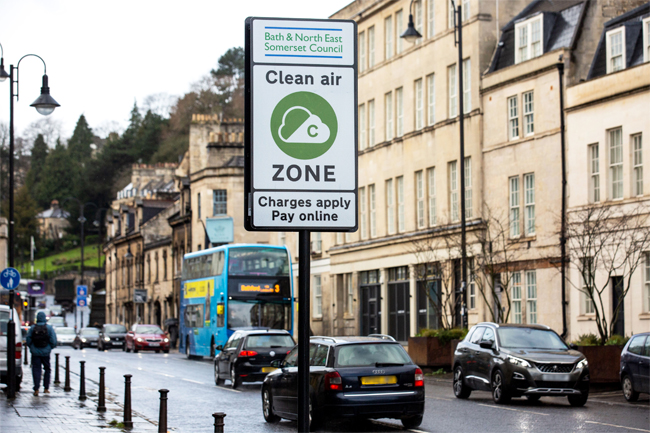Bath’s Clean Air Zone (CAZ), which exempts private cars from charging, failed to bring toxic air pollution within the city within legal limits last year, as directed by the Government.
Bath and North East Somerset (BANES) Council said the latest data indicates that the CAZ is ‘working to reduce air pollution’, with a 21% reduction in NO2 recorded across the city in 2021 when compared with 2019.
However, three sites within the zone continue to exceed the EU and UK limit value of 40 micrograms per cubic metre of air (μg/m3).
The council said that these sites, at Walcot Parade, Wells Road and Dorchester Street, ‘remain a concern for the council and will be carefully monitored’. It said that in 2019, 11 monitoring sites in Bath exceeded the limit value.

The London Road in Bath, with Walcot Parade in the distance
The CAZ was launched in March 2021 and charges all vehicles, except cars and motorbikes, that do not meet minimum emission standards to deter them from entering the zone.
The council said it has submitted data for review by the Government’s Joint Air Quality Unit (JAQU) and awaits the outcome of its assessment on whether the zone has achieved compliance with a ministerial direction to reduce NO2 in the city to within legal limits in ‘the shortest possible time’ and by the end of 2021 at the latest. It added that the assessment is now expected in the autumn.
A report to the council’s Climate Emergency Scrutiny Panel last week suggests that it is hoping to avoid the conclusion that it has failed to comply with the directive by virtue of a technicality.
It notes that ‘these monitoring locations have been historically located and do not accord with the Air Quality Standards Regulations 2010 upon which the Ministerial Directive was issued and JAQU base their formal assessment’.
Cllr Sarah Warren, deputy leader and cabinet member for climate and sustainable travel, sought to put a positive gloss on the continued existence of illegal levels of toxic air pollution in the city. She said: ‘We are heartened to see this data from the zone’s first year of operation, and the difference it’s making to air quality and therefore our health.
‘Three sites remain a concern for us, but these are being monitored, and the overall direction of travel looks good, with air quality at every monitoring station in Bath improving on baseline figures.
‘We know that high levels of NO2 are a public health risk, especially for people with existing heart and lung conditions. It can also cause fatal asthma attacks and affect children’s lung development.‘